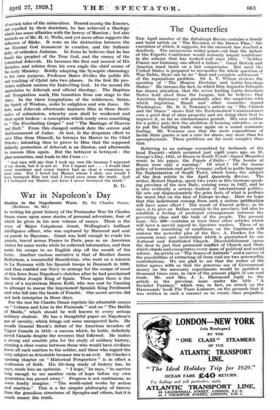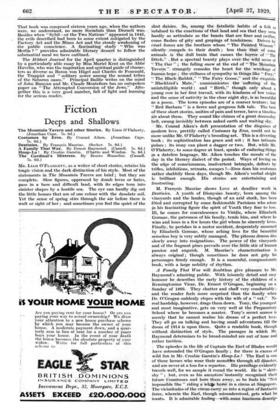The _Quarterlies .
Tim April nitmber of the Edinburgh Review contains a timely and lucid article on " The Revision of the Dawes Plan," the execution of which, it suggests, for the moment has reached a deadlock. The anonymous writer points out that the failure of the Experts Conference would seriously impair confidence in the scheme that has worked well since 1924. " Neither France nor Germany can afford a failure." Great Britain and America must' insist on a fair compromise. But until the United States is prepared to reconsider the whole question of War Debts, there can be no " final and complete settlement " of the reparations problem. Sir A. T. Wilson reviews the question of " The Monroe _Doctrine and Latin-American States." He stresses the fact, to which Don Augustin Edwards has drawn attention, that the-seven leading Latin-American States hold aloof from the League, but he believes- that American diplomacy will gradually allay the suspicions- with which Argentina, Brazil and other countries regard Washington. Mr. B. S: Townroe's article on The Church and the Slums " shows that the Ecclesiastical Commissioners own a good deal of slum property and are doing their best to improve it, so far as circumstances permit. His own outline for a policy puts first the abolition of housing subsidies, so as to put the building trade once again on a sound economic footing. Mr. Townroe sees that the mere expenditure of lavish State grants is not a cure for slums, any more than for unemployment. These problems are far more complex than that.
Referring to an outrage committed by hotheads of the local Fascisti—which occurred just eight years ago, on 8t. George's Day, 1921, at Bozen in South Tyrol—Signor Mussolini wrote in his paper, the Popolo d'Italia—" The bombs at Bozen were only a warning. Of what ? Of the insane policy of terrorism and petty tyranny, called in polite language the Italianization of South Tyrol, which forms the subject of the first article in the April Quarterly Review. The writer, Robert Dunlop, spent two years in this German-speak- ing province of the new Italy, coming away in 1927, and he is also evidently a serious student of international politics. He sets out dispassionately the grim facts of what is perhaps the worst blot on the face of Europe to-day. Dare we hope that this indictment coming from such a serious publication will have some effect ? The result of Fascist policy, as lie says, is to give an Italian varnish to the province, but also to establish a feeling of profound estrangement between the governing class and the bulk of the people. The present issue—No. 500--contains at least three other articles which will have a special appeal to Spectator readers. Those of us who know something of conditions on the Continent will endorse the' powerful plea of the Rev. A. Fawkes for the common sense and moderation which is guaranteed by our National and Established Church. Disestablishment opens the door to just that perennial conflict of Church and State which clouds and exasperates every issue of political and social reform. An article on The Senses of Animals " and a survey of the possibilities of extracting oil from coal are two noteworthy contributions. We are glad to see that the writer of the latter agrees with us that the generous use of Government money on the necessary experiments would be justified a thousand times over, in view of the present plight of our coal trade. Mr. and Mrs. J. L. Hammond reply to the article in the previous issue under the title " A Socialist Fantasy," which was, in fact, an attack on the Hammonds' book The Town Labourer, on' the grounds that it was written in such a manner as to create class prejudice. That book was composed sixteen years .ago, when the authors were, we understand, no more Socialists than Disraeli was Besides when "Sybil—or the Two Nations" appeared in 1845, the evils described had been to some extent mitigated by the Factory Act and the Mines Act and the steady awakening of the public -conscience. A -faseinating' study "-Wlib was Merlin ? " provides admirable literary dessert to follow the
substantial meal• we have outlined. - -
The Hibbert Journal for the April quarter is distinguished by a particularly able essay by Miss Muriel Kent on the Abbe Huvelin, who was the inspiration and spiritual guide of -charac-, tors as diverse as Baron von Hfigel and Charles de Foucauld, the Trappist and " solitary sower among the nomad tribes of the Saharan oases." Principal Malik writes on the mind of John Bunyan and Mr. Claude Montefiore has an outspoken paper on " The Attempted Conversion of the Jews." Alto- gether this is, a very good number, full of light and learning
for the serious reader. -









































 Previous page
Previous page